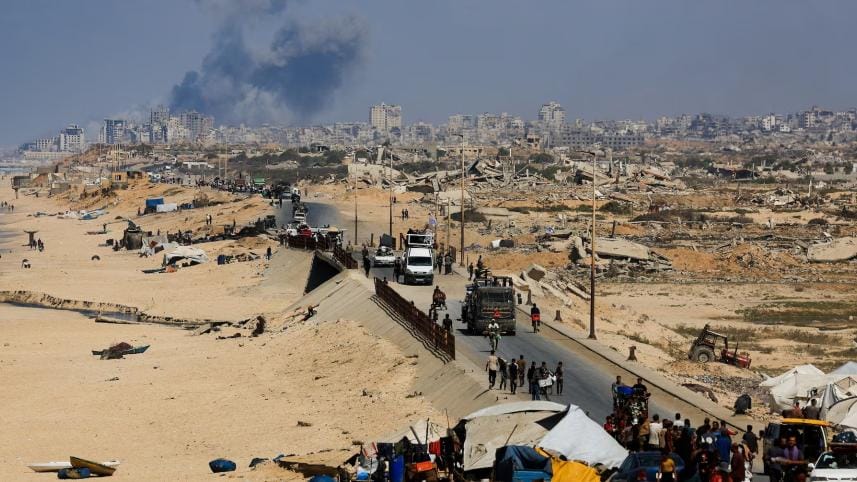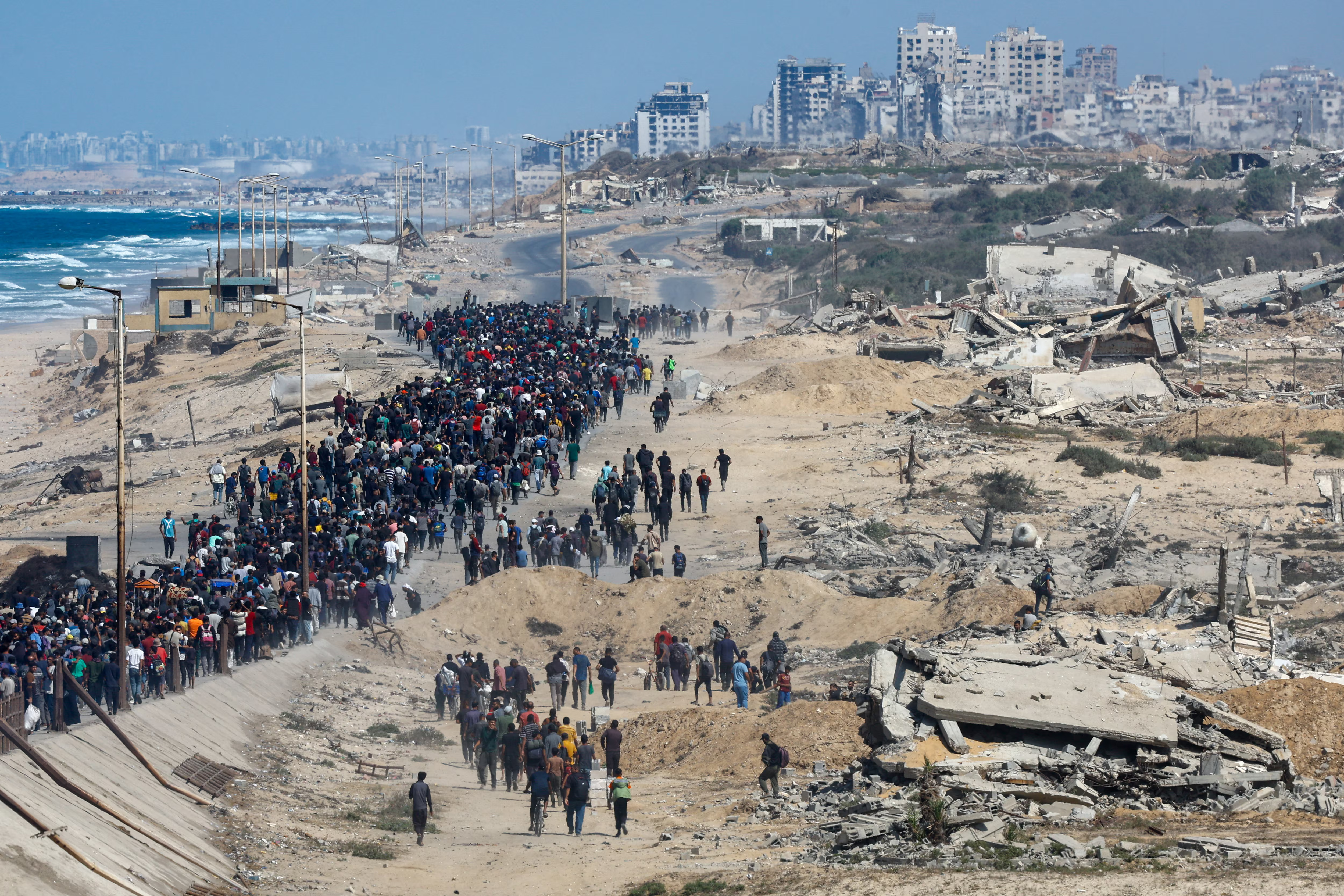Gaza's ‘peace’ and the unanswered questions of justice

Helicopters sweep low over Tel Aviv, casting moving shadows across a crowd of uplifted faces. Inside, freed hostages press their hands against the glass. A thousand miles away, amid the rubble of Gaza, buses carrying Palestinian prisoners cross a border that has become a monument to destruction. On the global stage, world leaders gather, shaking hands and declaring victory. This is the theatre of peace, quite meticulously staged.
But behind this performance lies a more complex and violent truth. Even as world leaders celebrate, the truce on the ground is already stained with blood. According to the Gaza Media Office, Israeli forces have killed 97 Palestinians and breached the ceasefire 80 times since it began. A wave of airstrikes on October 19—launched after two Israeli soldiers were killed—marked the most serious test of the agreement, killing dozens and reminding Palestinians that the silence after bombardment offers only a precarious and uncertain relief. In this fragile pause, justice remains the missing character.
For the people of Gaza, the silence after two years of bombardment is both a relief and an accusation. The guns have quietened, but the landscape they leave behind tells a story of profound loss. More than 67,000 Palestinian lives have been erased. Entire generations have been buried beneath the rubble of their homes, schools, and hospitals. The Trump administration's twenty-point peace plan promises a "de-radicalised, terror-free zone" and a "Gaza Riviera." Still, survivors return to a wasteland where even the earth seems to mourn.
The political victory and its careful ambiguities
In the Israeli Knesset, US President Donald Trump receives a standing ovation. Israeli Prime Minister Benjamin Netanyahu declares him "the greatest friend that the State of Israel has ever had in the White House." The peace plan itself is a masterpiece of political stagecraft—strong on spectacle, careful in its ambiguities.
The agreement establishes an international "Board of Peace" headed by Trump himself, with former British Prime Minister Tony Blair among its members. It promises to rebuild Gaza through a "panel of experts" who have previously created "thriving modern miracle cities." The language soars with promise, yet remains curiously earthbound in mechanism. Gaza will be governed by a "technocratic, apolitical Palestinian committee" under international supervision, with Hamas excluded.
The most telling provision appears near the end: "While Gaza re-development advances... the conditions may finally be in place for a credible pathway to Palestinian self-determination and statehood." That single word—"may"—does enormous political work, creating a possibility without a promise. Meanwhile, the agreement makes no mention of the ongoing international legal proceedings.
The slow, steady wheels of justice
While political leaders declare the war over, international law moves to a different rhythm. At the International Court of Justice (ICJ), where South Africa accused Israel of violating the Genocide Convention, the timeline is measured in years. Israel requested and was granted a six-month extension, pushing its deadline to January 2026. A hearing on the merits may not come until 2027, a reminder that international justice operates on a calendar ill-suited to political impatience.
At the International Criminal Court (ICC), which prosecutes individuals, progress has been swifter but faces different obstacles. The ICC prosecutor issued arrest warrants for Israeli Prime Minister Benjamin Netanyahu and Defence Minister Yoav Gallant for crimes against humanity, including murder and the war crime of starvation. Similar warrants have been issued for Hamas leaders.
Yet, here lies the rub: the ICC has no police force. It relies on member states to arrest wanted individuals. When Netanyahu visited Hungary, an ICC member state, he was not arrested. Hungary has since announced its intention to withdraw from the court. The message is clear: political realities often trump legal accountability.
These parallel processes—the swift political agreement and the slow judicial grinding—represent two different visions of conflict resolution. One seeks to stop the bleeding today; the other seeks to prevent infection tomorrow. The question is whether the bandage will be mistaken for a cure..
The Global South's role in preventing amnesia
For Bangladesh and other Global South nations, this moment presents both a challenge and an opportunity. We have seen this pattern before—where political solutions are celebrated while accountability is indefinitely postponed. The peace plan creates "institutional amnesia," a framework where rebuilding physically necessitates forgetting legally.
The Trump plan's provision for Hamas members to "be given amnesty" if they "commit to peaceful co-existence" stands in stark contrast to the ICC's arrest warrants for Hamas leaders. This is not merely a legal contradiction but a moral one; can peace built on unexamined violence be anything more than a temporary ceasefire between generations?
Global South countries must use their collective diplomatic weight to ensure that the ICJ and ICC processes continue unimpeded by the political momentum of the peace agreement. These cases represent the principle that international law applies equally to powerful and powerless nations alike.
As the Board of Peace begins its work, Global South voices should insist on transparency. The plan states that the board will "handle the funding for the redevelopment of Gaza" until the Palestinian Authority completes its reforms. This concentration of power without clear accountability risks creating a trusteeship that answers to donors rather than to the people of Gaza.
The peace that must come next
True peace is not merely the absence of explosions but the presence of justice. The survivors returning to Gaza's wasteland deserve more than new buildings on old graves; they deserve a future where the rules that protect human dignity are not suspended for political convenience.
The cinematic quality of the recent peace celebrations makes for compelling viewing. But the more important story is being written in the less glamorous courtrooms of The Hague, where evidence is weighed with judicial care rather than political calculation.
For policymakers in Bangladesh and across the Global South, the path forward requires sustaining attention on these parallel tracks—supporting the ceasefire while demanding that justice processes continue unimpeded. The temptation to declare the problem solved must be resisted, for peace without accountability is merely a pause, not a conclusion.
The rubble of Gaza will eventually be cleared. But the deeper reconstruction, the healing of psychic and social wounds, requires more than technocratic solutions. It demands the acknowledgement that some crimes cannot be balanced by prisoner exchanges or silenced by development projects.
The guns are quiet for now. But until justice finds its voice, this peace will remain a fragile, unfinished thing.
Zakir Kibria is a Bangladeshi writer, policy analyst, and entrepreneur based in Kathmandu, Nepal. He can be reached at zk@krishikaaj.com.
Views expressed in this article are the author's own.
Follow The Daily Star Opinion on Facebook for the latest opinions, commentaries and analyses by experts and professionals. To contribute your article or letter to The Daily Star Opinion, see our guidelines for submission.




 For all latest news, follow The Daily Star's Google News channel.
For all latest news, follow The Daily Star's Google News channel. 

Comments